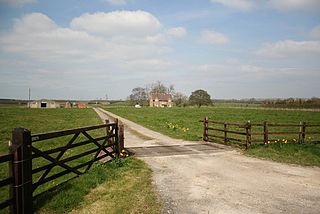
Estoppel is a judicial device in common law legal systems whereby a court may prevent or "estop" a person from making assertions or from going back on their word; the person so prevented is said to be "estopped". Estoppel may prevent someone from bringing a particular claim. Legal doctrines of estoppel are based in both common law and equity. Estoppel is also a concept in international law.

Central London Property Trust Ltd v High Trees House Ltd [1947] KB 130 is a famous English contract law decision in the High Court. It reaffirmed and extended the doctrine of promissory estoppel in contract law in England and Wales. However, the most significant part of the judgment is obiter dicta as it relates to hypothetical facts; that is, the landlord did not seek repayment of the full wartime rent.
Consideration is an English common law concept within the law of contract, and is a necessity for simple contracts. The concept of consideration has been adopted by other common law jurisdictions, including the US.

Hughes v Metropolitan Railway Co [1877] is a House of Lords case considered unremarkable for many years until it was resurrected in 1947 by Lord Denning in the case of Central London Property Trust Ltd v High Trees House Ltd in his development of the doctrine of promissory estoppel. The case was the first known instance of the concept of promissory estoppel.

Estoppel in English law is a doctrine that may be used in certain situations to prevent a person from relying upon certain rights, or upon a set of facts which is different from an earlier set of facts.

Balfour v Balfour [1919] 2 KB 571 is a leading English contract law case. It held that there is a rebuttable presumption against an intention to create a legally enforceable agreement when the agreement is domestic in nature.
The pre-existing duty rule is an aspect of consideration within the law of contract. Originating in England the concept of consideration has been adopted by other jurisdictions, including the US.

Consideration is a concept of English common law and is a necessity for simple contracts but not for special contracts. The concept has been adopted by other common law jurisdictions.

English contract law is the body of law that regulates legally binding agreements in England and Wales. With its roots in the lex mercatoria and the activism of the judiciary during the Industrial Revolution, it shares a heritage with countries across the Commonwealth, from membership in the European Union, continuing membership in Unidroit, and to a lesser extent the United States. Any agreement that is enforceable in court is a contract. A contract is a voluntary obligation, contrasting to the duty to not violate others rights in tort or unjust enrichment. English law places a high value on ensuring people have truly consented to the deals that bind them in court, so long as they comply with statutory and human rights.

Waltons Stores (Interstate) Ltd v Maher, is a leading case in Australian contract law. The Australian High Court decided that estoppel, in certain circumstances, could be a cause of action.

Merritt v Merritt [1970] EWCA Civ 6 is an English contract law case, on the matter of creating legal relations. While under the principles laid out in Balfour v Balfour, domestic agreements between spouses are rarely legally enforceable, this principle was rebutted where two spouses who formed an agreement over their matrimonial home were not on good terms.

Crabb v Arun District Council [1975] EWCA Civ 7 is a leading English land law and contract case concerning "proprietary estoppel". Lord Denning MR affirmed that where agreements concern the acquisition of rights over land, there is no need for both parties to provide a consideration for upholding the bargain. While promissory estoppel cannot found a cause of action it was held that in the peculiar situation of land, consideration is not necessary at all.
Cobbe v Yeoman's Row Management Ltd[2008] UKHL 55 is a House of Lords case in English land law and relates to proprietary estoppel in the multi-property developer context. The court of final appeal awarded the project manager £150,000 on a quantum meruit basis for unjust enrichment because Yeoman's Row had received the benefit of his services without paying for that. The court refused to find or acknowledge a binding contract, prior arrangement with a third party or promise, overturning a £2m award on the basis of a possible lien arising from a promise over the property. The court found a non-binding agreement in principle, entirely subject to the owner's final say to take into account for example their view of the market; this was the basis on the facts on which the parties were proceeding.

Proprietary estoppel is a legal claim, especially connected to English land law, which may arise in relation to rights to use the property of the owner, and may even be effective in connection with disputed transfers of ownership. Proprietary estoppel transfers rights if
Collier v P & MJ Wright (Holdings) Ltd[2007] EWCA Civ 1329 is an English contract law case, concerning the doctrine of consideration and promissory estoppel in relation to "alteration promises".

Ogilvy v Hope Davies [1976] 1 All ER 683 is an English contract law case concerning promissory estoppel.

Gillett v Holt [2000] is an English land law case concerning proprietary estoppel and a farming businesses' dispute. The case focussed on a farmer of a portfolio of farming businesses without any obvious heirs who made many promises and assurances of inheritance to two partial farm managers who were neighbours or tenants of his, one of whom had farmed for 38 years, the other co-farmed for the last 5 years of those 38 years.

P v P [1957] NZLR 854 is an often cited High Court of New Zealand case regarding promissory estoppel as far as meeting the rights are suspended and not terminated, one of the seven requirements in order for this to apply. It reinforces the English case of Tool Metal Mfg Co ltd v Tungsten Electric Co Ltd [1955] 2 All ER 657.

Rock Advertising Ltd v MWB Business Exchange Centres Ltd[2018] UKSC 24 is a judicial decision of the Supreme Court of the United Kingdom relating to contract law, concerning consideration and estoppel. Specifically it concerned the effectiveness of "no oral variation" clauses, which provide that any amendments or waiver in relation to the contract must be in writing.













